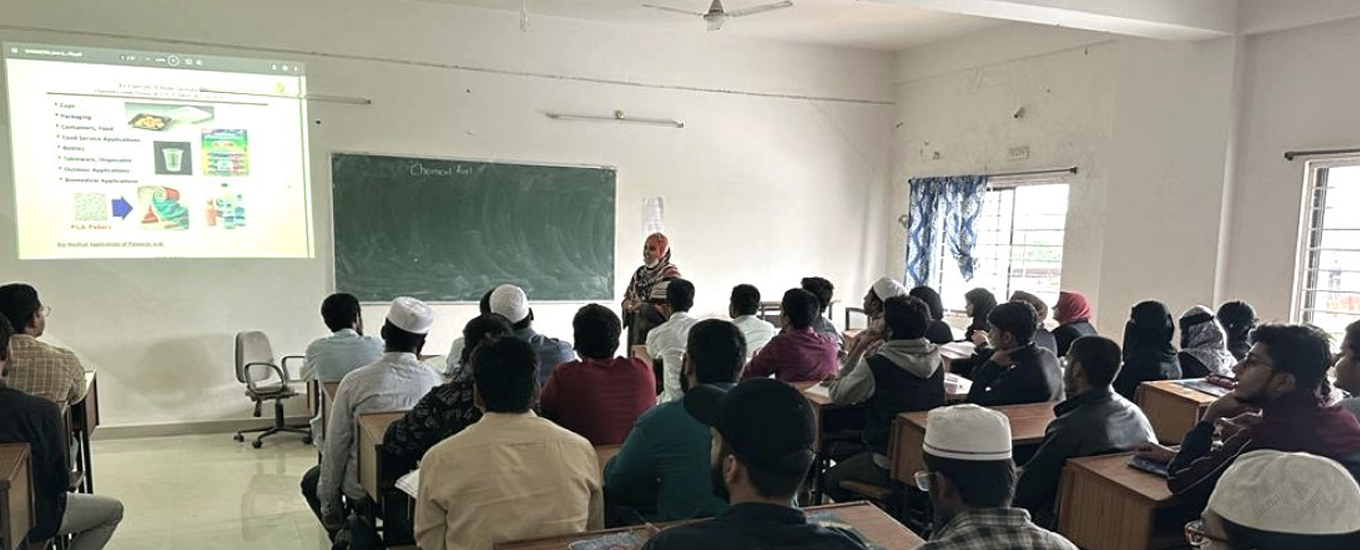
PEO'sPSO'sPO'sCO's
Program Educational Objectives (PEOs):
- PEO1:Shall apply fundamental and advanced knowledge and skills in basic and engineering sciences, to find suitable solutions to technological challenges and problems in various areas of engineering and real life areas using modern tools.
- PEO2 :Shall be cable of identifying, analyzing and synthesize data and technical concepts from applications to product design. Practice science and humanities in a responsible, professional, and dedicated manner by functioning effectively either as an individual or as a member of multi – disciplinary teams, for accomplishing common goals.
- PEO3 :Shall acquire good job opportunities in industries or pursues graduate degrees in engineering and other fields.
- PEO4 :Shall develop the ability to engage in lifelong learning, research and develop in a responsible, professional, dedicated and ethical manner for the benefit of the industry and society at large without detriment to environment and sustainable development.
Program Specific Outcomes (PSOs):
- PSO1: Professional Skills: An ability to understand ,demonstrate,, analyze, apply the skills and knowledge gained from fundamental courses of science & humanities and engineering and relate these fundamentals with core subjects in the relevant field.
- PSO2: Problem-Solving Skills: An ability to solve complex Engineering problems, using the basic knowledge of science and humanities in latest software and hardware tools, along with analytical skills to arrive cost effective and appropriate solutions.
Program Outcomes (POs):
Engineering Graduates will be able to:
Engineering Graduates will be able to:
-
PO1: Engineering Knowledge:
Apply knowledge of mathematics, natural science, computing, engineering fundamentals and an engineering specialization as specified in WK1 to WK4 respectively to develop solutions to complex engineering problems. -
PO2: Problem Analysis:
Identify, formulate, review research literature and analyze complex engineering problems reaching substantiated conclusions with consideration for sustainable development. (WK1 to WK4) -
PO3: Design/Development of Solutions:
Design creative solutions for complex engineering problems and design/ develop systems/ components/ processes to meet identified needs with consideration for public health and safety, whole-life cost, net zero carbon, culture, society and environment as required. (WK5) -
PO4: Conduct Investigations of Complex Problems:
Conduct investigations of complex engineering problems using research-based knowledge including design of experiments, modelling, analysis and interpretation of data to provide valid conclusions. (WK8) -
PO5: Engineering Tool Usage:
Create, select and apply appropriate techniques, resources and modern engineering and IT tools, including prediction and modelling, recognizing their limitations to solve complex engineering problems. (WK2 and WK6) -
PO6: The Engineer and the World:
Analyze and evaluate societal and environmental aspects while solving complex engineering problems for their impact on sustainability with reference to economy, health, safety, legal framework, culture and environment. (WK1, WK5, and WK7) -
PO7: Ethics:
Apply ethical principles and commit to professional ethics, human values, diversity and inclusion; adhere to national and international laws. (WK9) -
PO8: Individual and Collaborative Team Work:
Function effectively as an individual, and as a member or leader in diverse and multi-disciplinary teams. -
PO9: Communication:
Communicate effectively and inclusively within the engineering community and society at large, including the ability to comprehend and write effective reports and design documentation, and make effective presentations considering cultural, language, and learning differences. -
PO10: Project Management and Finance:
Apply knowledge and understanding of engineering management principles and economic decision-making to one’s own work, as a member or leader in a team, and to manage projects in multidisciplinary environments. -
PO11: Life-Long Learning:
Recognize the need for, and have the preparation and ability for:
i) independent and life-long learning,
ii) adaptability to new and emerging technologies,
iii) critical thinking in the broadest context of technological change. (WK8)
- S&H-COs and Articulation Matrices-2025-26 Sem-II
- S&H-Course Outcomes-2025-26 Sem-I
- S&H-Course Outcomes-2024-25 Sem-II
- S&H-Course Outcomes-2024-25 Sem-I
- S&H-Course Outcomes-2023-24 Sem-II
- S&H-Course Outcomes-2023-24 Sem-I
- S&H-Course Outcomes-2022-23 Sem-II
- S&H-Course Outcomes-2022-23 Sem-I
- S&H-Course Outcomes-2021-22 Sem-II
- S&H-Course Outcomes-2021-22 Sem-I
- S&H-Course Outcomes-2020-21 Sem-II
- S&H-Course Outcomes-2020-21 Sem-I
- S&H-Course Outcomes-2019-20-Sem-II
- S&H-Course Outcomes-2019-20-Sem-I
